研究生英语阅读教程(提高级) Lesson_18
研究生英语阅读教程(二)提高级翻译
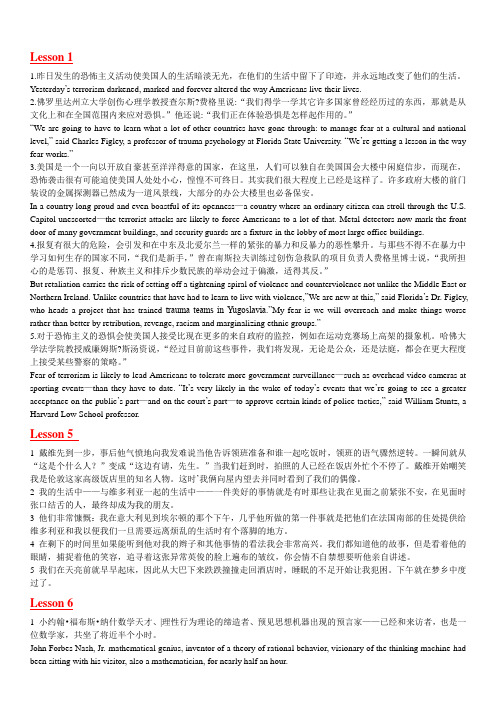
Lesson 11.昨日发生的恐怖主义活动使美国人的生活暗淡无光,在他们的生活中留下了印迹,并永远地改变了他们的生活。
Yesterday’s terrorism darkened, marked and forever altered the way Americans live their lives.2.佛罗里达州立大学创伤心理学教授查尔斯?费格里说:“我们得学一学其它许多国家曾经经历过的东西,那就是从文化上和在全国范围内来应对恐惧。
”他还说:“我们正在体验恐惧是怎样起作用的。
”“We are going to have to learn what a lot of other countries have gone through: to manage fear at a cultural and national level,” said Charles Figley, a professor of trauma psychology at Florida State University. “We’re getting a lesson in the way fear works.”3.美国是一个一向以开放自豪甚至洋洋得意的国家,在这里,人们可以独自在美国国会大楼中闲庭信步,而现在,恐怖袭击很有可能迫使美国人处处小心,惶惶不可终日。
其实我们很大程度上已经是这样了。
许多政府大楼的前门装设的金属探测器已然成为一道风景线,大部分的办公大楼里也必备保安。
In a country long proud and even boastful of its openness—a country where an ordinary citizen can stroll through the U.S. Capitol unescorted—the terrorist attacks are likely to force Americans to a lot of that. Metal detectors now mark the front door of many government buildings, and security guards are a fixture in the lobby of most large office buildings.4.报复有很大的危险,会引发和在中东及北爱尔兰一样的紧张的暴力和反暴力的恶性攀升。
研究生英语阅读教程(提高级)课后习题翻译(带原文、最全版)
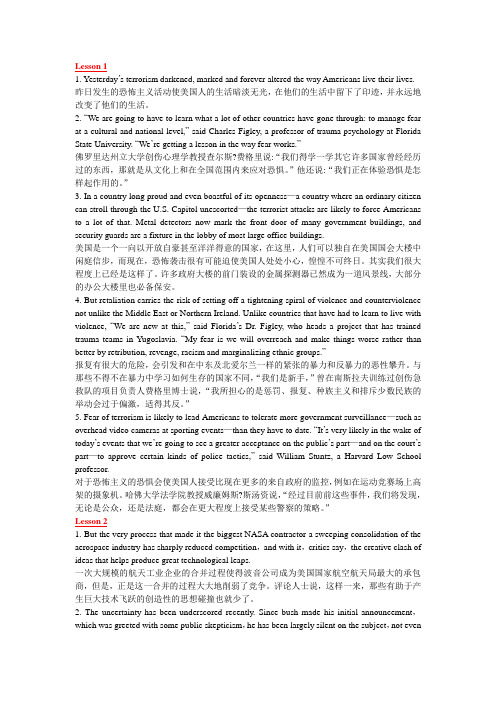
Lesson 11. Yesterday’s terrorism darkened, marked and forever altered the way Americans live their lives. 昨日发生的恐怖主义活动使美国人的生活暗淡无光,在他们的生活中留下了印迹,并永远地改变了他们的生活。
2. “We are going to have to learn what a lot of other countries have gone through: to manage fear at a cultural and national level,” said Charles Figley, a professor of trauma psychology at Florida State University. “We’re getting a lesson in the way fear works.”佛罗里达州立大学创伤心理学教授查尔斯?费格里说:“我们得学一学其它许多国家曾经经历过的东西,那就是从文化上和在全国范围内来应对恐惧。
”他还说:“我们正在体验恐惧是怎样起作用的。
”3. In a country long proud and even boastful of its openness—a country where an ordinary citizen can stroll through the U.S. Capitol unescorted—the terrorist attacks are likely to force Americans to a lot of that. Metal detectors now mark the front door of many government buildings, and security guards are a fixture in the lobby of most large office buildings.美国是一个一向以开放自豪甚至洋洋得意的国家,在这里,人们可以独自在美国国会大楼中闲庭信步,而现在,恐怖袭击很有可能迫使美国人处处小心,惶惶不可终日。
研究生英语阅读教程(提高级第二版)PPT A_reading_18

Warm-up Activities
"As the summer went on George felt in a good mood about things." He occasionally buys paperback books but he never gets around to reading them. Yet, "he could feel approval on all sides." "For a few weeks" he talks only once with Mr. Cattanzara, who says nothing about the books. George decides to stay away from "the change maker."
"Then one night" George sees Mr. Cattanzara, a little drunk, walking toward him. He hands a nickel to George, saying "Go buy yourself a lemon ice, George," as he used to do when George was a "squirt." Asked to name one book on the list he has read so far, George cannot answer. After saying, "George, don't do what I did," Mr. Cattanzara leaves.
Warm-up Activities
考研英语阅读中英全文对照版 (18)
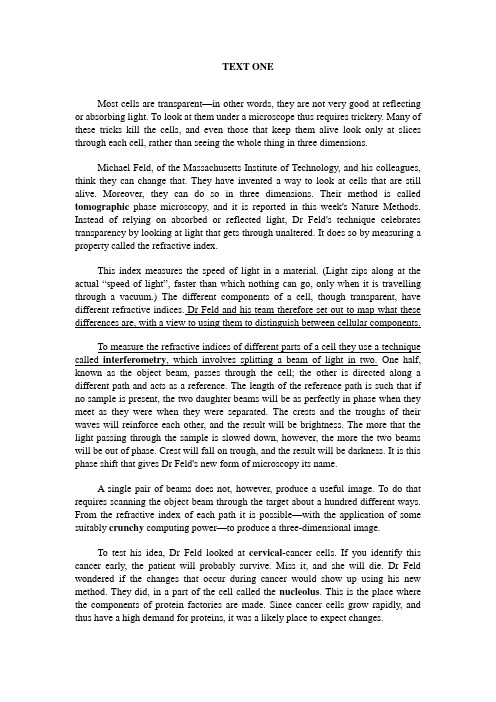
TEXT ONEMost cells are transparent—in other words, they are not very good at reflecting or absorbing light. To look at them under a microscope thus requires trickery. Many of these tricks kill the cells, and even those that keep them alive look only at slices through each cell, rather than seeing the whole thing in three dimensions.Michael Feld, of the Massachusetts Institute of Technology, and his colleagues, think they can change that. They have invented a way to look at cells that are still alive. Moreover, they can do so in three dimensions. Their method is called tomographic phase microscopy, and it is reported in this week's Nature Methods. Instead of relying on absorbed or reflected light, Dr Feld's technique celebrates transparency by looking at light that gets through unaltered. It does so by measuring a property called the refractive index.This index measures the speed of light in a material. (Light zips along at the actual “speed of light”, faster than which nothing can go, only when it is tra velling through a vacuum.) The different components of a cell, though transparent, have different refractive indices. Dr Feld and his team therefore set out to map what these differences are, with a view to using them to distinguish between cellular components.To measure the refractive indices of different parts of a cell they use a technique called interferometry, which involves splitting a beam of light in two. One half, known as the object beam, passes through the cell; the other is directed along a different path and acts as a reference. The length of the reference path is such that if no sample is present, the two daughter beams will be as perfectly in phase when they meet as they were when they were separated. The crests and the troughs of their waves will reinforce each other, and the result will be brightness. The more that the light passing through the sample is slowed down, however, the more the two beams will be out of phase. Crest will fall on trough, and the result will be darkness. It is this phase shift that gives Dr Feld's new form of microscopy its name.A single pair of beams does not, however, produce a useful image. To do that requires scanning the object beam through the target about a hundred different ways. From the refractive index of each path it is possible—with the application of some suitably crunchy computing power—to produce a three-dimensional image.To test his idea, Dr Feld looked at cervical-cancer cells. If you identify this cancer early, the patient will probably survive. Miss it, and she will die. Dr Feld wondered if the changes that occur during cancer would show up using his new method. They did, in a part of the cell called the nucleolus. This is the place where the components of protein factories are made. Since cancer cells grow rapidly, and thus have a high demand for proteins, it was a likely place to expect changes.Dr Feld also has plans to use beams of different colours, since each colour has a slightly different refractive index in a given material. That would provide extra data for the computer to chew on, and probably result in better pictures. With enough pictures, Dr Feld's technique may make biology as transparent as the cells it studies. 参考译文:大多数的细胞都是透明的,也就是说,他们没有很强的反射或吸收光的能力强。
07年考研英语阅读理解精读100篇unit18

Hello back there! This is me, in the future. It's great here. We finally have robots that do things for us, although none of them are very attractive, at least not after the third or fourth date. Dogs and cats developed the power of speech several years ago, and turn out to have very little interesting to say beyond requests for food and, on the part of cats,expressions of condescension. One thing that has not changed in the 50 years since you guys were merging and purging all over the place is our reliance on media. Today we have 484,567,543 channels of great programming, which correspond exactly to the population of the U.S. It's really fabulous. Each of us has his or her own mix that completely serves our interests and virtual habits. I say virtual habits because none of us have any real habits to speak of, good or bad. They were outlawed in 2025,and most of us agree that we're happier without any. Our programming mixtures reach us through a variety of pipelines all owned by one of four Great Big Media Companies. These are all exactly alike in their collection of assets, each of them owning broadcast, narrowcast, die-cast, retrocast and cybercast, broadband, narrowband, audio, video, satellite and an upload-and-download phalanx of option-driven interfaces. Each of our Great Big Media Companies has thousands of brands that make us feel all warm and toasty and provide an emotional connection to a past that nobody can actually remember. We love our GBMCs and buy their stocks all the time. And they're getting bigger. Not long ago, the largest GBMC declared itself to be a nation, established a virtual army and invaded Nova Scotia. Right now, it's fighting the Canadians, who are holding out for preferred stock in the new entity before they capitulate. So things have changed a lot, except maybe for one thing. As I'm dictating this into the cyber-neural-net, I am sitting on a soft object with a rather high back, which is necessary as, like all other human beings now, I have no real bone structure. That's right, it's my beloved couch! I sit on my couch all day long. I do business from my couch, since everything is now conducted online. I am served my meals on my couch. My family members catch up with one another's virtual day while sitting on our couch. The only time we leave our couch is when we are conveyed upstairs to bed, which is just another couch. So from our couch to yours, hello! That's your future! See you there! 注(1):本⽂选⾃Time;02/21/2000, p58; 注(2):本⽂习题命题模仿对象2003年真题text 4; 1.What is implied in the first paragraph? [A] The future life will be much greater than the present life. [B] Robots will become as smart as human beings in the future life. [C] What will be described in the passage is quite absurd. [D] Cats and dogs will surely develop the power of speech in the future. 2.The author uses the phrase “couch potato” to mean those who ________. [A] spends a lot of time sitting at home watching television, surfing internet, reading etc. [B] prefer to have potatoes as meals while sitting on the couch [C] prefer to sleep on couch rather than on bed [D] indulge themselves only in sleeping and eating 3.The author's attitude towards the four Great Big Media Companies is probably one of ______. [A] strong disapproval [B] mild satire [C] reserved consent [D] enthusiastic support 4.In contrast to the great changes in the virtual future, one thing that has not changed is ______. [A] our way of life [B] the social status of pets like dogs and cats [C] our habits and memories of the past [D] our dependence on television, computer, radios, newspapers, etc. 5.The text intends to express the idea that ______. [A] people will live a happier life in the future [B] people will do business at home in the future [C] human beings tend to degenerate with increasing immobility [D] people will have more free time to pursue their hobbies 答案:CABDC 篇章剖析 本⽂以调侃荒诞的笔调,向⼈们描述了未来过度依赖媒体的可怕场景。
考研英语阅读理解精读训练题目及答案解析UNIT18

考研英语阅读理解精读训练题目及答案解析UNIT18TEXT ONEPier 17 in downtown Manhattan is not the most likely destination for theatre-goers. But here on the East River, among the wailing seagulls, frying fish and tourists, is an enchanting offer of entertainment. Spiegelworld is back in town for its second summer, with two spicy cabaret shows of dance, music, acrobatics and burlesque. Called “Absinthe” and “La Vie”, the shows are staged in the anachronistic opulence of a spiegeltent (Flemish for “tent of mirrors”).Nobody seems to know how many of these European pavilions are left but most people agree that there are fewer than 20. Built by hand without nails, spiegeltents are beautiful assemblies of teak, velvet, stained glass and bevelled mirrors, created originally in Belgium in the early 20th century as mobile dance halls. Only two families in Belgium and the Netherlands still know how to make them, producing one every five or ten years or so, says Vallejo Gantner, one of the show's producers and a long-time spiegeltent aficionado. “But you know it when you walk into an old one. They have a special boutique quality.”This one, which dates from the 1920s and has a painted art-nouveau fa?ade, lends continental glamour to the pier. It holds about 350 people on wooden chairs and banquettes around a modest, circular stage. And it is this intimacy, this proximity to the performers, that gives these shows their special feel. Erotic contortionists, balletic hand-balancers and bawdy jugglers emanate a sweaty, tangible humanity. Many of them, Mr Gantner explains, have left larger circus troupes, such as Cirque du Soleil, in order to make eye-contact with their audience. The simplicity of the staging gives their performancesa gritty authenticity.Once in a while, a family on a children's outing is fooled by Spiegelworld's festive red-and-blue tent spires. Make no mistake: the shows are for adults. “La Vie”, created by Les 7 Doigts de la Main, a Montreal-based troupe, laces an array of artfully sexy circus acts with the premise that everyone is dead and in pur gatory, travelling on “a flight to hell that never quite gets there”. Wearing what looks like a straitjacket, a contortionist moves in a highly unsettling way to a recording of “Crazy”, crooned by Patsy Cline. The show closes with a steamy pas de deux between the devilish master of ceremonies and the evening's lip-curling seductress.“Absinthe” is a more explicit grab-bag of stripping, cross-dressing and intrigue, without a unifying theme. The show's strongest moments come from the acrobats, all of whom carry a powerful sexual charge. Two women sway with suggestive grace on the trapeze. An aerialist in black trousers, his sculpted chest glistening, pulls and twists himself up two hanging straps to the lusty music of “Jealous Guy”, sung by a transvestite diva.Sexy but not tawdry. Despite colourful language and a brief moment of unnecessary male nudity in “La Vie”, the setting is too elegant and the talent too astonishing for that. It's a bit of risqué fun that has been warmly received by New Yorkers, many of whom have grown tired of thewholesome, tourist-friendly fare of Broadway. Last summer “Absinthe” ran for two months to sell-out crowds; this year's two-show programme is for three months until the end of September. 1.According to the passage, Spiegelworld is probably _____[A] a series shows of dance, music, acrobatics and burlesque with boutique quality [B] a mobile dance hall of long history as well asexquisite decoration [C] a troupe performing certain programmes for the public.[D] a traditional form of entertainment derived from some ancient European countries.2.By mentioning that “Pier 17 in downtown Manhattan is not the most likely destination for theatre-goers”, the author wants to _____[A] imply that theatre-goers are paying much attention to the environment of performance. [B] show that Pier 17 is not a place for a formal performance of the theatre. [C] prove that the shows in Spiegeltent are very attractive[D] tell us the status of the place where the shows of “Absinthe” and “La Vie” are presented. 3.The performances staged in the spiegeltents are different from the other ones mainly in that _____[A] they are on show in the pier rather than in the theatre.[B] the seats are arranged around the stage so that the audience can watch the performers closely. [C] they are of a sweaty, tangible humanity and a like of enticing simplicity. [D] it is much easier for their performers to make eye-contact with their audience.4.In the fourth paragraph, the author gives a detailed description of “La Vie” in order to _____ [A] imply that Spiegelworld is characterized by suggestive sexy scenes and is mainly oriented to the adults.[B] showcase the fact that the performance is sexually attractive, but far from tawdry. [C] demonstrate the profound meaning conveyed by the surface of the performance.[D] give a general impression of the specific performance and illustrate that people should not be deluded by the representation.5.Which one of the following statements is TRUE of the performances staged in spiegeltents?[A] Only two families in Belgium and the Netherlands know howto give such performances.[B] The performances are characteristic of erotic shows. [C] The performances are always given with an explicit motif. [D] The performances are mainly given to the mass rather than the elite.篇章剖析:这篇文章主要讲述了一种传统演出团队的表演。
(完整版)研究生英语阅读教程提高级课后习题
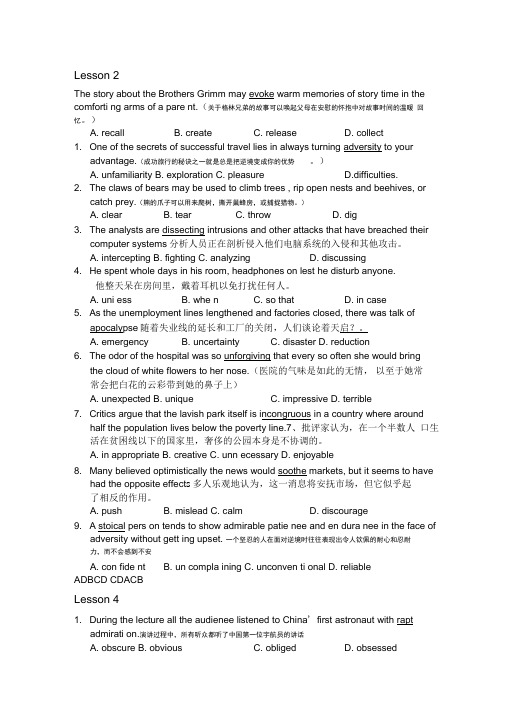
Lesson 2The story about the Brothers Grimm may evoke warm memories of story time in the comforti ng arms of a pare nt.(关于格林兄弟的故事可以唤起父母在安慰的怀抱中对故事时间的温暖回忆。
)A. recallB. createC. releaseD. collect1. One of the secrets of successful travel lies in always turning adversity to youradvantage.(成功旅行的秘诀之一就是总是把逆境变成你的优势。
)A. unfamiliarityB. explorationC. pleasureD.difficulties.2. The claws of bears may be used to climb trees , rip open nests and beehives, orcatch prey.(熊的爪子可以用来爬树,撕开巢蜂房,或捕捉猎物。
)A. clearB. tearC. throwD. dig3. The analysts are dissecting intrusions and other attacks that have breached theircomputer systems分析人员正在剖析侵入他们电脑系统的入侵和其他攻击。
A. interceptingB. fightingC. analyzingD. discussing4. He spent whole days in his room, headphones on lest he disturb anyone.他整天呆在房间里,戴着耳机以免打扰任何人。
A. uni essB. whe nC. so thatD. in case5. As the unemployment lines lengthened and factories closed, there was talk ofapocalypse随着失业线的延长和工厂的关闭,人们谈论着天启?。
研究生英语阅读教程(二)提高级翻译及口语
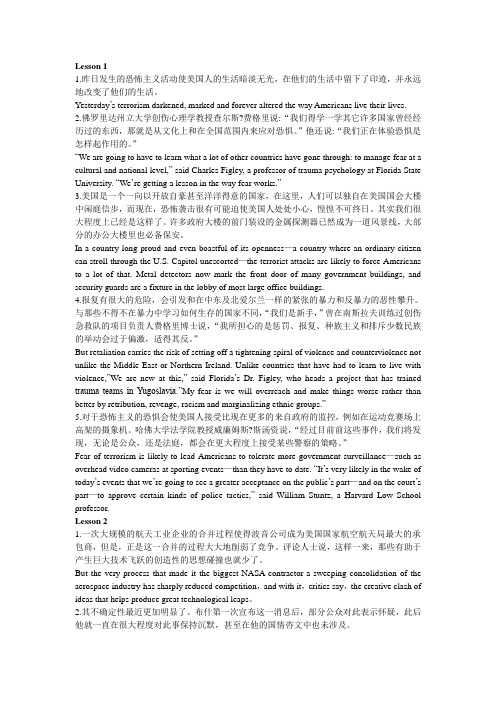
Lesson 11.昨日发生的恐怖主义活动使美国人的生活暗淡无光,在他们的生活中留下了印迹,并永远地改变了他们的生活。
Y esterday’s terrorism darkened, marked and forever altered the way Americans live their lives. 2.佛罗里达州立大学创伤心理学教授查尔斯?费格里说:“我们得学一学其它许多国家曾经经历过的东西,那就是从文化上和在全国范围内来应对恐惧。
”他还说:“我们正在体验恐惧是怎样起作用的。
”“We are going to have to learn what a lot of other countries have gone through: to manage fear at a cultural and national level,” said Charles Figley, a professor of trauma psychology at Florida State University. “We’re getting a lesson in the way fear works.”3.美国是一个一向以开放自豪甚至洋洋得意的国家,在这里,人们可以独自在美国国会大楼中闲庭信步,而现在,恐怖袭击很有可能迫使美国人处处小心,惶惶不可终日。
其实我们很大程度上已经是这样了。
许多政府大楼的前门装设的金属探测器已然成为一道风景线,大部分的办公大楼里也必备保安。
In a country long proud and even boastful of its openness—a country where an ordinary citizen can stroll through the U.S. Capitol unescorted—the terrorist attacks are likely to force Americans to a lot of that. Metal detectors now mark the front door of many government buildings, and security guards are a fixture in the lobby of most large office buildings.4.报复有很大的危险,会引发和在中东及北爱尔兰一样的紧张的暴力和反暴力的恶性攀升。
- 1、下载文档前请自行甄别文档内容的完整性,平台不提供额外的编辑、内容补充、找答案等附加服务。
- 2、"仅部分预览"的文档,不可在线预览部分如存在完整性等问题,可反馈申请退款(可完整预览的文档不适用该条件!)。
- 3、如文档侵犯您的权益,请联系客服反馈,我们会尽快为您处理(人工客服工作时间:9:00-18:30)。
Language Points
1. get on somebody's nerves (line 4, para. 2) informal if someone gets on your nerves, they annoy you, especially by doing something all the time 触某人的神经,使某人紧张不安; 触某人的神经,使某人紧张不安;惹得某人心烦 那声音吵得我心烦。请你把音量旋小点好吗? ① 那声音吵得我心烦。请你把音量旋小点好吗? That noise gets on my nerves. Will you please turn down the volume? 睡眠不足使他心烦意乱。 ② 睡眠不足使他心烦意乱。 Lack of sleep got on his nerves. 他的两个儿子互相闹得不安宁。 ③ 他的两个儿子互相闹得不安宁。 His two sons were getting on each other’s nerves.
"One night," after staying in his room "for almost a week" George sneaks to the park unable to stand the heat. Unexpectedly, he finds people still friendly to him. A man on a street corner asks him if it is true that "he had finished reading so many books."
Chronology of Events "As the summer went on George felt in a good mood about things." He occasionally buys paperback books but he never gets around to reading them. Yet, "he could feel approval on all sides." "For a few weeks" he talks only once with Mr. Cattanzara, who says nothing about the books. George decides to stay away from "the change maker." "Then one night" George sees Mr. Cattanzara, a little drunk, walking toward him. He hands a nickel to George, saying "Go buy yourself a lemon ice, George," as he used to do when George was a "squirt." Asked to name one book on the list he has read so far, George cannot answer. After saying, "George, don't do what I did," Mr. Cattanzara leaves.
Warm-up Activities
"After a couple of days," George sees Mr. Cattanzara again. He feels that Mr. Cattanzara "had started the rumor that he had finished all the books."
"One evening in the fall," George runs to the library and "though he was struggling to control an inward trembling, he easily counted off a hundred, then sat down at a table to read."
Lesson 18
A Summer’s Reading
CATALOGUE
About the Author Warm-up Activities Language Points Keys Oral Practice And Discussion
text
About the Author
Bernard Malamud (1914-86) born: April 26, 1914, Brooklyn, N.Y., U.S. died: March 18, 1986, New York, N.Y. American novelist and short-story writer who made parables(寓言故事) 寓言故事) 寓言故事 out of Jewish immigrant life. A son of Russian Jews, Malamud was educated at the City College of New York (B.A., 1936) and Columbia University (M.A., 1942). He taught at high schools in New York City (1940-49), at Oregon State University (1949-61), and at Bennington College, Vt. (1961-66, 1968-86).
Warm-up Activities
One evening, while on his walk, George meets Mr. Cattanzara coming home very late from work. George tells him that he is reading one hundred great books in the library list. He wants Mr. Cattanzara to respect him. "After that", George does nothing different from usual but he finds the people in the neighborhood start calling him "a good boy." He feels himself being respected because of the books he is not reading.
The author
• Saul Bellow • Dangling Man • 1976 Nobel Prize for literature • Malamud • The Assistant • Frank Moties
1. When and where did this story take place?
Warm-up Activities
"The next night" George is afraid to leave his room. Sophie finds out that his brother is not reading a single book on the list and calls him a "bum."
Warm-up Activities
Chronology of Events Nearly four years ago, George Stoyonovich had quit high school "on an impulse" when he was sixteen. "This summer" [the beginning of the story] is a hard time for jobs and George, now "close to twenty", has none. Having no money to spend, he stays off the streets and spends most of the day in his room. Sophie urges him to read some "worthwhile books" but he is in no mood for them: "Lately he couldn't stand made-up stories, they got on his nerves."
About the Author
His first novel, The Natural (1952), is a fable about a baseball hero who is gifted with miraculous powers. The Assistant (1957) is about a young Gentile hoodlum and an old Jewish grocer. The Fixer (1966) takes place in Russia. The story of a Jewish handyman(杂务工) unjustly (杂务工) imprisoned for the murder of a Christian boy, it won Malamud a Pulitzer Prize. His other novels are A New Life (1961), Dubin's Lives (1979), and God's Grace (1982).
